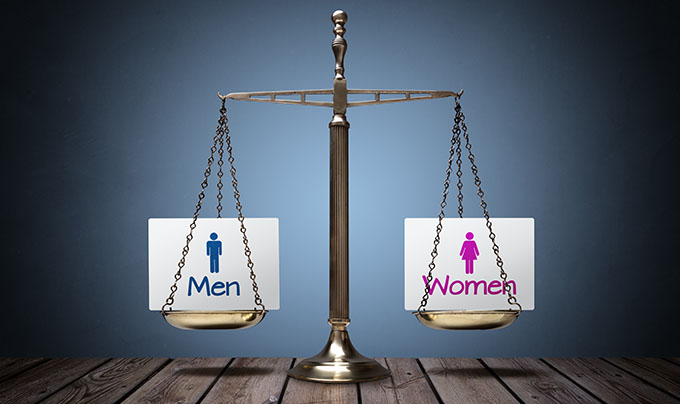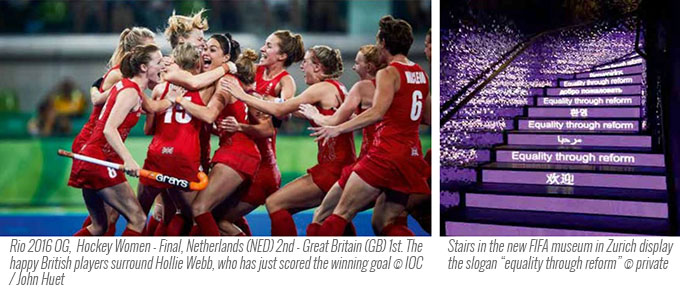Search the latest and greatest job opportunities in sport

Sylvia Schenk is the Chair of Working Group Sport at Transparency International, the global movement aiming to put a stop to corruption. Here Slyvia shares her views on the vital need to further focus on gender equality in both sport practice and governance.
When Canadian Prime Minister Justin Trudeau was asked for the reasons that led to his half-female cabinet, his answer was simply: “Because it’s 2015!” He did not need to explain that the time had come for gender equality in politics. In international sport, women are still a rare species in top positions. So if we ask whether and why there should be more women in leadership – is it as easy as that, Just “because it’s 2017”? Well, yes and no.
Women’s participation has increased fast in competition sport since the 1990s with all sports at the Olympic Games, even boxing, now open for women, and no national team participating without at least one female athlete. However, there is still a long way to go for comprehensive gender equality in sports.
To Empower girls and women is therefore a challenge for the Olympic Movement.
While the importance of physical activity for a healthy life is acknowledged all over the world, there are still deficiencies with girls and women even prevented in some countries from exercising, thus facing considerable health risks, especially obesity. To empower girls and women is therefore a challenge for the Olympic Movement, naming the “practice of sport” a human right in its Fundamental Principles of the Olympic Charter. Credibility in this can only be achieved only if female athletes as role models are complemented by women having a say at all levels of national and international sport.
In the Olympic Agenda 2020, the IOC aims at 50 percent participation of women in the Olympic Games (Recommendation 11) and stipulates “gender balance” as a criterion in the recruitment process for IOC membership (Recommendation 38). The International Federations and the National Olympic Committees have yet to follow.
To raise the number of women in sport practice and governance all over the world is far more than just a symbolic act or a question of fairness. It will help to further develop the sport business (with increasing marketing opportunities for the sporting goods industry, too). Above all, it will bring new ideas into sport with an impact on its traditionally “male” culture.
Diversity has become an important aspect in the economy. Global players in all industries know that nowadays gender- balanced teams perform much better than homogeneous ones. To include different perspectives helps to develop better solutions as the mixture of knowledge and skills increases the understanding of the questions at stake and thus the quality of decisions. This applies even more if it is about a “people’s business” like sport.
Additionally, in the current situation with international sport under high public scrutiny of its ethical performance – from doping scandals to corruption and human rights abuses in connection with major sport events – women are needed urgently in top positions to disturb the “old boy network”, which in some federations has led to an all-time low in trust. Of course, being female does not automatically mean ethical behavior. But as women up to now have had no or only little power in sport, they play no role in ongoing investigations.

FIFA has realized what women can bring to the future development in its reform process 2015/2016 and approved a quota of at least six women in its new highest body, the Council. The Australian lawyer Moya Dodd initiated a global movement with thousands of emails sent to FIFA to achieve this important first step. More has to follow – in football and beyond.
So it is not (just) because it’s 2017 – sport needs gender equality on all levels to benefit from the knowledge, skills, experience and views of women, and to increase its credibility and quality for the sake of women and men
Learn more about Transparency Internationals work in Sport here .
This article was originally published by our partner the WFSGI (World Federation for Sporting Goods) in their annual magazine .
Search the latest and greatest job opportunities in sport
In the world of professional sports, sponsorship represents a significant source of revenue and plays a vital role for t...
Read moreThe sports industry is a vibrant and multifaceted industry, made up of a diverse range of sectors that shape its global ...
Read morePablo Romero, director of protocol at Sevilla FC and lecturer in the UCAM Master's Degree in Sports Management, shares t...
Read more